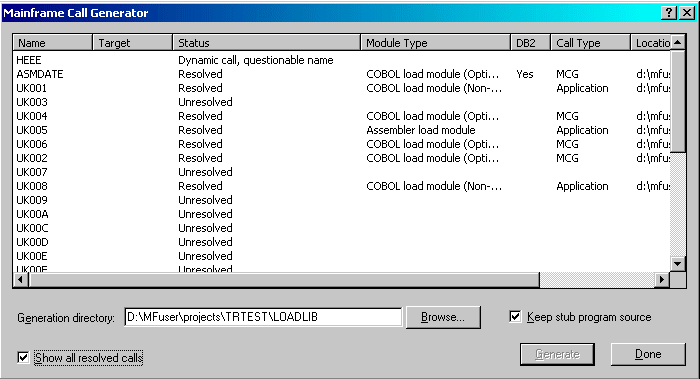Once you have specified the programs containing the subprograms you want to create stubs for, information about the subprograms is displayed in the Mainframe Call Generator dialog box. It is from the Mainframe Call Generator dialog box that you specify the subprograms to create stubs for.

The following list shows the information presented by the Mainframe Call Generator dialog box:
- Name
- The name of the called subprogram. If the called subprogram's name is specified by a data item, the name of the data item is shown.
- Target
- The name of the subprogram to be called on the mainframe. This is usually the same as the program-name in the Name column, but can be changed by editing a subprogram's properties.
- Status
- The status of the call to the subprogram. This can be one of the following:
- Resolved - the called subprogram's .gnt or .int code has been found in one of the load libraries of the project.
- Unresolved - the called subprogram's .gnt or .int code has been found in one of the load libraries of the project.
- Dynamic call, questionable name - the call is to a subprogram whose name is specified by a data item.
- Module Type
- Whether or not the COBOL subprogram is optimized. This can be one of the following:
- COBOL load module (non-optimized) - the subprogram has been compiled to intermediate (.int) code.
- COBOL load module (optimized) - the subprogram has been compiled to generated (.gnt) code.
- Assembler - the subprogram is written in Assembler.
- Dynamic link library (DLL) - the subprogram is in a dynamic link library.
- DB2
- Whether or not the called subprogram uses DB2. Edit the subprogram's properties to change this setting.
- Call Type
- The type of call made that will be made when the application is run. This can be one of:
- Application - the application will call a user-written subprogram.
- MCG - the application will call a stub generated by the Mainframe Call Generator.
- blank - Mainframe Call Generator is unable to determine the type of call.
- Location
- The location of the found subprogram.









